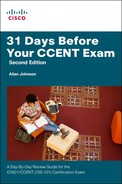Post-Exam Information
The accomplishment of signing up for and actually taking the CCENT exam is no small feat. Many network engineers have avoided certification exams for years. The following sections discuss your options after exam day.
Receiving Your Certificate
If you passed the exam, you will receive your official CCENT certificate in about six weeks (eight weeks internationally) after exam day. Your certificate will be mailed to the address you provided when you registered for the exam.
You will need your examination score report to access the certification tracking system and set up a login to check your certification status. If you do not receive your certificate, you open a case in the certificate online support located at the following web address:
https://ciscocert.secure.force.com/english/MainPage
When you receive your certificate, you might want to frame it and put it on a wall. A certificate hanging on a wall is much harder to lose than a certificate in a filing cabinet or random folder. You never know when an employer or academic institution could request a copy.
Your CCENT certification is valid for three years. To keep your certificate valid, you must either pass the CCENT exam again or advance to the CCNA certification before the end of the three-year period.
Determining Career Options
After passing the CCENT exam, be sure to add your CCENT certification to your resume. Matthew Moran provides the following advice for adding certifications to a resume in his book Building Your I.T. Career: A Complete Toolkit for a Dynamic Career in Any Economy, 2nd Edition (Pearson IT Certification, 2013. ISBN: 0789749432):
I don’t believe you should place your certifications after your name. It is presumptuous to pretend that your latest certification is the equivalent to someone who has spent 4–7 years pursuing a Ph.D. or some other advanced degree. Instead, place your certifications or degrees in a section titled Education and Certifications. A master’s degree might be the exception to this rule.
Moran also discusses good strategies to break into the IT industry after you have earned your CCENT:
The most important factor is that you are moving toward a career goal. You might not get the title or job you want right out of school. If you can master those skills at your current position, while simultaneously building your network of contacts that lead to your dream position, you should be satisfied. You must build your career piece by piece. It won’t happen all at once.
Moran also outlines in his book that certifications such as the CCENT and CCNA are part of an overall professional skill set that you must continually enhance to further your IT career.
Your CCENT certificate proves that you are disciplined enough to commit to a rigorous course of study and follow through with your professional goals. It is unlikely that you will be hired simply because you have a CCENT, but it will place you ahead of other candidates. Even though you have listed the CCENT on your resume, it is important to highlight your networking skills that pertain to the CCENT in your job and skills descriptions on your resume.
Examining Certification Options
Although passing the CCENT exam is not an easy task, it is the starting point for more advanced Cisco certifications such as the CCNA Routing and Switching (200-120), CCNA Security (640-554), CCNA Voice (640-461), CCNA Wireless (640-722), or even CCNP-level exams. When you log in to the online certification tracking tool (use the exam report to do this), be sure to view the certification progress link. This link provides specific information about certifications that you can achieve with your CCNA as the base.
If You Failed the Exam
If you fail your first attempt at the CCENT, you must wait at least 5 calendar days after the day of the exam to retest. Stay motivated and sign up to take the exam again within a 30-day period of your first attempt. The score report outlines your weaknesses. Find a study group and use The Cisco Learning Network online community to help you with those difficult topics.
If you are familiar with the general concepts, focus on taking practice exams and memorizing the small details that make the exam so difficult. If you are a Cisco Networking Academy alumnus, you have access to the curriculum, and Packet Tracer provides an excellent network simulator. Consider your first attempt as a formal practice exam and excellent preparation to pass the second attempt.
Summary
Whether you display your certificate and update your resume or prepare to conquer the exam on your second attempt, remember to marvel at the innovation and creativity behind each concept you learn. The ability of our society to continually improve communication will keep you learning, discovering, and employed for a lifetime.
